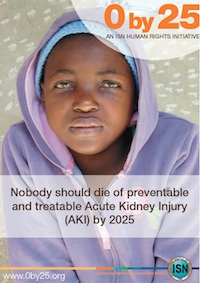 The outcome of the Acute Kidney Injury (AKI) Global Snapshot, an innovative web-based global cohort study carried out under the ISN 0by25 Initiative, is published in The Lancet today.
The outcome of the Acute Kidney Injury (AKI) Global Snapshot, an innovative web-based global cohort study carried out under the ISN 0by25 Initiative, is published in The Lancet today.
Including 4,000 patients in over 72 countries, the study assessed similarities and differences in recognizing and managing AKI globally.
The study found that over half of the patients in the study, developed AKI in the community rather than in hospital settings. This points to the need to improve the early recognition and management of AKI in these out-of-hospital settings.
Furthermore, 8% of patients with clinical indications for renal replacement therapy were not dialyzed due to inability to afford therapy (Low/Lower Middle Income Countries – LLMIC) or futility (High Income countries – HICs and Upper Middle Income Countries – UMICs). This confirms the need for continued work with governments to ensure access to treatment for all those in need.
The most prevalent AKI causes were hypotension (40.2%) and dehydration (38.2%) and common etiological factors across all countries were identified, which seems to support a standardized approach for early recognition and treatment
Overall, AKI mortality at 7 days was calculated at 11% and was higher in LLMICs than HICs, pointing to a need to tackle AKI in these more vulnerable communities.
Building on these findings, in the next two years, ISN will set up a series of pilot projects in selected health centers worldwide in Africa, Asia and Latin America to test education interventions to reduce the number of preventable AKI deaths, especially focusing on community-acquired AKI patients in LLMIC settings.
The findings of these pilot projects will be unveiled at the World Congress of Nephrology 2017 in Mexico City.
Read the full statement, HERE.
For more information, visit: www.isn-online.org/initiatives/0by25
